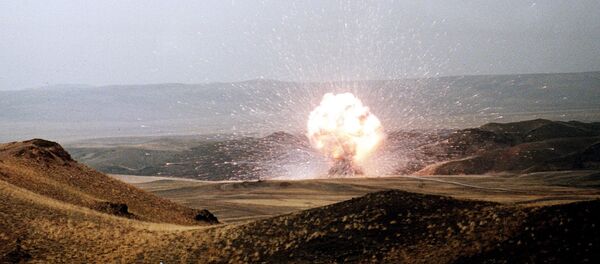Asked whether the INF Treaty may be revised during the Trump administration, Wallander, who served as Special Assistant to the President and Senior Director for Russia and Eurasia on the National Security Council from 2013-2017 said, "I haven’t talked to the Trump administration about this. I think it’s very unlikely under the Trump administration."
However, Wallander said she would not rule out that the next US administration becomes interested to revive the INF Treaty accord — if Russia is serious about the value of the accord.
READ MORE: Russia Slams US 60-Day Ultimatum on INF Treaty as 'Game'
"First on the agenda would be Russia coming back into the compliance with the original terms of the INF Treaty," Wallander said. "I think it would be extremely difficult, but I would never say it was impossible."
Last October, US President Donald Trump announced his intention to withdraw from the INF Treaty due to alleged violations by Russia. In particular, US officials have voiced concern over Russia's 9M729 missile, which, according to Washington, violates the treaty’s provisions.
On December 4, Secretary of State Mike Pompeo gave Russia two months to "return to compliance" with the INF Treaty or the United States would leave the accord on February 2.
READ MORE: Quitting INF: US Likely to Develop New Missiles to Counter China – Scholar
Wallander said the INF Treaty was a very valuable accord in the interests of Russia and the United States.
"I think it was a mistake by the Russian government to violate the treaty covertly," she said. "I think it was a mistake of the United States, of the Trump administration, to not get serious about negotiating and getting back the treaty’s strength. But that’s now water under the bridge, it’s done."
Wallander expressed concern that Russia will find that there are less constraints on US military deployments globally.
"I am concerned that Russia will find that otter countries now will begin to wonder whether intermediate range forces are in their interests, and that I think is a net negative for strategic stability as Russia faces it," Wallander said. "I think Russians need to think seriously about greater transparency in discussions with multiple countries about the dangers of proliferation of this kind of weapons."
On 31 January Russian Deputy Foreign Minister Sergei Ryabkov reaffirmed Moscow's intention to continue working toward a settlement on the disputed INF Treaty, adding that there was "no reaction whatsoever to our demands on US MK-41 universal launching systems already deployed in Romania and set to be deployed in Poland as part of Aegis Ashore complexes," which, Russia believes, contradict the Intermediate-Range Nuclear Forces (INF) Treaty.
READ MORE: NATO Has Been Preparing For Collapse of INF Treaty for Months – Report
The INF Treaty was signed in 1987 by then leader of the Soviet Union Mikhail Gorbachev and then US President Ronald Reagan. The two leaders agreed to destroy all cruise or ground-launched ballistic missiles with ranges between 500 and 5,500 kilometers (310 and 3,400 miles).






